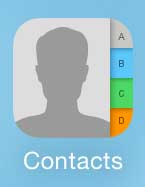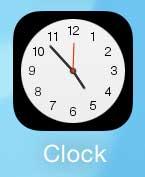But the option for a passcode is there for a reason, and Apple has even gone so far as to try and get you to use it by default. So if you are asking yourself why you should take that extra time and hassle to input a passcode each time you want to unlock your iPhone, then check out some of the reasons below. If you’ve been thinking about switching to an Android phone, then a Google Pixel is a great option. Our Google Pixel 4A screenshot article can show you how to capture pictures of the screen on that device.
1. Your Email is Set Up on Your iPhone
Really? This is the first reason that we are going to list? Absolutely. Think about all of the sensitive information that flows in and out of the email account on your iPhone. Now think about how easy it is to view when your phone is unlocked. Anyone that is holding your phone and can access your Home screen can see any of the emails that are on your device. Whether it’s a friend, family member or thief, there are probably things in your email that you would prefer to remain private. And when you factor in that password reset functions typically send an email to the address associated with the account that you are trying to reset, anyone with access to your emails can now lock you out of some of your accounts.
2. Personal Photos on Your Camera Roll
The iPhone is the most commonly used camera in the world, by a large margin, and people take all kinds of pictures with it. Some are more private than others, and are meant to be shared with only one or two people. But a malicious person that is accessing your phone could find those pictures and share them with anyone. This is a specific problem that might only affect a small percentage of people, but it can be devastating if it happens. And it might not even be from a stranger. A jealous friend or a mean sibling might decide that a picture they found on your phone needs to be shared with all of your contacts.
3. Purchases Can Be Made Directly from the iPhone
The simplicity of purchasing apps, songs, movies and TV shows on the iPhone has probably cost you a few dollars over time. But you are spending your own money, which adds a level of personal responsibility to the transaction. Someone with access to your device and the iTunes Store can spend a lot of money in a hurry, with little regard for what it is costing you. And this might not even be limited to a thief. A younger child or family member might not realize what they are doing, and decide that they want to watch every episode of Spongebob Squarepants, or download every album from a top 40 artist that they recognize.
4. Easy Access to All of Your Contacts
If a thief takes possession of your device, then they are probably going right after the data, or they are going to see how much money they can get for a used iPhone. But your contacts might not realize that your phone has been stolen, and simply reply to a text message from your phone assuming that it is you. A lot of people might go out of their way to try and help out a friend who asks them to send money because they are stuck somewhere, even if the request includes something strange like sending that money to someone else’s name. The simple assumption that it is you on the other end of that text message might be all that is necessary for a thief to con some of your friends or relatives.
5. It Buys You Some Time if Your iPhone Gets Stolen
The 4-digit passcode is not the most secure thing in the world, and there are only 10000 possible combinations that you can use. But too many incorrect entries blocks access to the phone for a short period of time, and even more incorrect entries can completely block access. People can reset iPhones with iTunes and a computer, also, but doing so will erase all of the data on the iPhone, at least securing the information that you had on there. These two roadblocks should give you enough time to remotely wipe the device to secure your information, then you can contact your provider to cancel service and let them know that the device was stolen. You can read this article to learn how to set up a passcode on the iPhone 5, and you can read this one if you are willing to accept these risks and want to disable the passcode. After receiving his Bachelor’s and Master’s degrees in Computer Science he spent several years working in IT management for small businesses. However, he now works full time writing content online and creating websites. His main writing topics include iPhones, Microsoft Office, Google Apps, Android, and Photoshop, but he has also written about many other tech topics as well. Read his full bio here.
You may opt out at any time. Read our Privacy Policy





